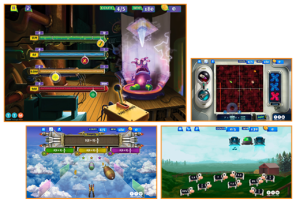When we think of games, we often think of them as somewhat trivial or just for fun, but can a game-based learning environment really change the way students learn and teachers teach?
Researchers agree that people learn best in a game environment, more than any other traditional form of instruction, but why?

People love games. We like to have fun and we especially like to win. While it may go without saying, this tendency holds true in a learning environment as well.
Winning doesn’t necessarily imply there is a loser. Some of the best game-based instructional tools provide students with a judgement-free learning environment, helping them achieve many small wins over time that lead to higher motivation and less stress.
This concept also counters the pass/fail model of testing and evaluations by allowing students to focus more on learning the material and improving so that they can move on to the next level.
Game-based learning programs can also foster a spirit of classroom collaboration if structured with a common goal in mind, such as points leading to a party or charitable donations. These activities help motivate students to work hard and push through obstacles in order to achieve a collective win.

Math Games that Work
Schools that implement online game-based learning programs within their regular curriculum can reach students who typically struggle with subjects such as math.
For one thing, understanding the ‘process’ is crucial in mathematics. Games keep students engaged and excited about learning while motivational elements provide rewards–which, in turn, keep students engaged in the process of learning key math concepts.
Likewise, such game-based math instruction can foster student collaboration and help transition classrooms from a fixed mindset to a growth mindset.
Game-based learning has been proven to be particularly effective in mathematics as students can quickly become frustrated or lose confidence in their abilities if not keeping up with their peers. And let’s face it, math can be challenging! Students feel comfortable in a gaming environment as it allows for “safe failure” and personalized attention.
Helping students stay in a positive mindset while struggling with mathematics can be difficult without additional resources. Many schools are turning to game-based learning programs as a supplemental tool for math intervention, remedial math support, or summer learning programs.
Math games are great for:
Game-based learning has become an integral part of building an exceptional math classroom, particularly one in which students begin the year in need of extra support.
For more information on implementing game-based learning at your school or district, visit our Curriculum page.


